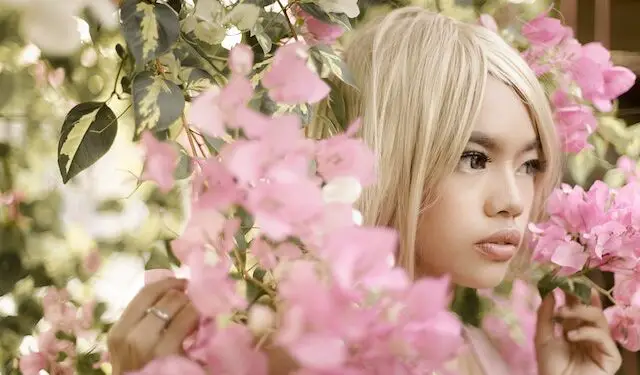How To Style Hair Under A Wig?
Using a wig is an excellent way to change your appearance or safeguard your hair’s natural appearance during healing from conditions like Alopecia.
However, thick or long hair can be difficult to hide under the hood of a hair wig.
The positive side is there are various options for styling your hair using the wig to make you look stunning and hide the natural hair beneath.
Five Methods To Style Your Hair Under Hair Extension.
Plaits
One of the most simple methods to style your hair under hair extensions is by plaits. They’re an excellent option to cover your hair’s natural texture and permit easy access to the scalp to cleanse and moisturize. If you’re trying to avoid tangles, brush your hair before plaiting it.
A different option is cornrows. They’re ideal for covering thick or rough hair. Also, they have a softer surface, meaning your hair doesn’t get as bumpy when you wear a wig. This can make it more comfortable to wear.
Braids are a popular method of hiding your natural hair underneath the wig. They’re a fantastic option to shield your hair and are simpler than cornrows for creating. They’re also more suitable for those with short hair as they can be sprayed using a gel for wigs that will ensure that your hair stays in position.
The only issue with braids is that they could become tangled if you do not use the correct products. For instance, ORS Olive Oil Fix-It Grip Gel Ultra Hold is a great option to keep braids from getting tangled.
Utilizing shea butter and other shea products to moisten your wig can help keep it smooth and free of tangles. You can also apply Shine or wig spray to your wig. This can give it a boost of shine.
If you’re a woman with short or curly hair, then using the LOC method is a fantastic method to ensure that your hair stays silky and free of tangles under your wig. This is because curly hair is extremely vulnerable to breaking and dryness.
In the beginning, it’s necessary to build the base of your hair. This can be accomplished using pin curls. They assist in anchoring the wig in the right place. Ideally, you’ll need to have two solid flat pin curls on your head, one on each side.
After you’ve made your curls of pins, put them on over the crown of your head, and fix them using Bobby pins. Do not pin them too far, as they don’t need to be thrown over your ears.
Also, you should ensure that the hair is snugly positioned on top of your head. If your wig is large or too loose, you might find it difficult to put it on or remove. In the same way, if your wig is small or tight, it could make your scalp sweat or overheat. To prevent overheating, avoid washing your wig for a long duration or wear it on hot days.
Twists

There are many methods to dress your hair without the wig, but one of the simplest and most efficient is to use two twists. This style requires little maintenance and is suitable for any natural texture. They are also simple to set up and remove.
Twists can also be a fantastic style to protect your hair over hair extensions as they aid in retaining moisture and keep your hair from drying out too quickly, especially if you’re a regular exercise enthusiast. While they protect your hair’s natural hair, they also provide the additional benefit of increasing the length and volume!
Before you begin to put in your twists, be sure that your hair is clean and dry. This will ensure that your twists of two strands last longer and keep fizziness at bay.
Begin with sections of hair by wrapping your fingers around the hair from the root to the tip, beginning at the top of the hair and moving to the bottom. Use a comb with a wide tooth to eliminate any knots as you work.
Then, you should split your hair in the middle. This is essential because it ensures that your twists are uniform and doesn’t appear uneven. Depending on the length as well as the texture of your fabric, you might require several different pieces.
After you’ve made your section and are satisfied with it, apply a substantial volume of leave-in conditioning on the sectioned hair strands and seal the moisture by applying an oil or gel. Applying the LOC (layering a leave-in conditioner first, followed by an oil, and finally applying a cream) technique is the best for this as it provides the most moisture to your hair.
You can now begin twisting your strands, making sure to be gentle when you twist them because they’re still soft. The twists will help keep your twists in place and prevent knots that can hinder the removal.
If you’re ready to pull your twists, make certain not to pull them gently from your scalp. Then, you can brush your twists, slick the hairline using gel, and then secure them using bobby pins, ensuring they’re secured.
Buns
If you’ve ever had to style your hair using a wig, you know that it could be a little difficult. However, there are various ways to get the style you desire without much effort or time.
The most well-known technique is low buns that keep the sides and top of your hair straight. This technique is best suited for thin or short hair; however, it is difficult to achieve with thicker or longer hair.
Another way to make the perfect bun is by twists or braids that help conceal parts of your hair. To achieve this look, you’ll require a lace-front hairstyle and clear ponytail holders for attaching your braids and twists to the hair.
With your fingers, grab small pieces of hair on each part of the head. Next, create an unflattering bun on the crown of your head. This will cover the edges of the wig and give your hair a more defined look.
To prevent it from falling onto the wig, pin it using Bobby’s pins. When sporting a front lace hairstyle, apply a bit of lighter powders or concealers to the parting of your hair to conceal the lace grid and minimize the visibility of your hair beneath.
Put the wig cap on to protect your wig and stop it from falling off. It is important to select the right wig cap to match the color of your base hair.
Use your hands and fingers to drag the front to its back. It is possible to employ this technique if you are wearing a lace-front wig and don’t have a cap on it.
When making a wig bun, safeguard your hair by using shea butter or other moisturizing and sealing products, such as hair spray. This will keep your hair healthy and soft and is particularly important when you frequently wear a wig because it could dry out your hair.
While it could appear like an easy task taking your time and effort to prepare your hair before deciding to wear a wig is an extremely crucial step to get the best result. This involves washing your hair frequently and ensuring it’s clean and free of any buildup from products, sweat, sweat, and other hair tangles. Also, you should apply an oil-based moisturizer and leave-in conditioner on your hair’s natural hair to keep it from breaking.
Updos

A wig is a great method to experiment with new hairstyles and not have to be concerned about damaging your actual hair. However, styling a wig requires certain knowledge and a few techniques. Here are a few suggestions to help you get started:
The first step is to pick the right wig to suit the type of hair you want and your appearance. Human hair wigs work best; synthetic wigs can also be an alternative.
After you’ve discovered the hairstyle that is right for you and your style, you need to begin planning how to make it look more attractive. There are many various options to choose from, such as braids, half-up styles, and buns.
If you’re confident enough, try some of these more complex braids. For instance, a French side braid with a low bun is a delightful variation of the traditional hairstyle.
Another great idea is to incorporate an additional hairpiece or braided hairband to give your hair more dimension and appearance. These are simple to add to your wig and will create a well-finished look quickly.
Most of the time, however, the simplest hairstyle is a flat bun. Put a little hair underneath your wig cap and secure it using Bobby’s pins.
As well as a basic bun, you can incorporate a variety of accessories such as hair clips, scarves, and ribbons to make a more sophisticated style. If you’re unsure what to do with your wig, talk to a stylist and find out what is suitable for your hairstyle.
When styling hair, it is most important to care for it properly. This means staying clear of products that contain silicon (especially in your conditioner and shampoo) to prevent tangles, matting, and a dry, brittle look that could cause breaking or premature loss of a wig.
How To Style Long Hair Under A Wig?
Start With Dry, Clean Hair.
It’s crucial to start with clean and dry hair so that it is more manageable. So first, cleanse and condition the hair and then blow-dry it until completely dry.
Brush Your Hair Back
Use a comb or brush to gently brush your hair to your side. This creates an even surface for your hair to rest upon.
Make Sure You Tie Your Hair In An Elongated Ponytail
Use a tie to hold your hair in an elongated ponytail placed near the neck’s nape. Make sure your ponytail is as smooth and flat as it can be.
Braid Your Ponytail

Tie it back when your hair is in a low ponytail, and you have it braided tightly. This will keep your hair straight and will prevent it from bulging beneath the hair.
Use Bobby Pins To Fix Your Braid.
Use bobby pins to secure the braid onto the side of the head. Make sure your braid is as straight as possible, and use the number of bobby pins you require to hold it in position.
Put On A Wig Cap
Before putting on your wig, make sure you put on a cap for your wig. This will keep the hair completely in its place and keep it from sticking out underneath the wig.
Adjust The Wig
After the wig has been put fixed, make sure it is resting comfortably over your head. Check for lumps or bumps and ensure that the wig appears natural.
Style The Wig

Based on the kind of wig you’re wearing, it’s possible to style it using the use of heat tools or hair products. Make sure not to damage the wig, and be sure to follow the instructions of the manufacturer.
Secure The Wig
After styling the wig, use bobby pins or wig tape to fix the wig to your head. Be sure that it’s secure and comfortable, as well as that it’s not shifting or sliding.
Finalize With Hairspray
To keep the hair in place, you can finish by spraying a small amount of hairspray. This will keep your hair, as well as the hair wig in place throughout the day long.
How To Hide Hair Under A Wig Without A Cap?
Section Your Hair
Begin by dividing your hair into smaller sections. Clips are used to keep each section in the right place. This will allow you to ensure that your hair stays smooth and flat underneath the hair wig.
Use Bobby Pins

Bobby pins are an excellent tool for hiding your hair behind the wig. After separating your hair using bobby pins, secure each section of hair flatly against your head. Make sure you use enough pins to hold the hair in its place but not too many that cause bumps or lumps.
Apply A Wig Grip Band
A wig grip band can be an ideal alternative to a cap for a wig. It’s a soft elastic band comfortable on your head and holds the hair in the right place. Using the wig grip band to keep your hair’s place is also possible, making it simpler to cover the hair.
Create A Low Ponytail
You can create a ponytail with a low cut just below the neck’s nape if you have long hair. This will keep your hair straight and smooth underneath the wig. Use bobby pins to hold the ponytail to ensure it’s as straight as possible.
Braid Your Hair

Hair braids are an excellent method to conceal your hair under a beard. First, begin braiding it tight to ensure no bumps or lumps. After you’ve finished your braiding, you can use bobby pins to anchor the braid to your head.
Use A Headband
If you’re short in hair, you can use an elastic band to hold your hair in the right place. A thin headband will work best since it doesn’t create lumps or bumps underneath the hair. Make sure your headband rests comfortably on your head, and use bobby pins to hold it in place if you need to.
Apply Hairspray
After tucking your hair away under the wig, spray it with hairspray to hold the hair in the right place. This will also stop frizz or flyway’s. Make sure you apply a light hair spray that won’t cause your hair to become too hard or sticky.
Check For Bumps
Before you put on your hairpiece, look for lumps or bumps that may be present inside your hair. Then, use hairspray or bobby pins to smooth any troublesome areas.
















